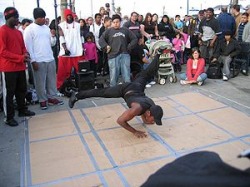Effects

Hip-Hop has made considerable social impacts since its inception in the 1970s. Orlando Patterson, a sociology professor at Harvard University helps describe the phenomenon of how hip hop spread rapidly around the world and diffusion of Global. Professor Patterson argues that mass communication is controlled by the wealthy, government, and businesses in Third World nations and countries around the world. Professor Patterson believes that mass communication created a global cultural hip hop scene. As a result, the youth absorb and are influenced by the American hip hop scene and start their own form of hip hop. Professor Patterson believes that revitalization of hip hop music will occur around the world as traditional values are mixed with American hip hop musical forms, and ultimately a global exchange process will develop that brings youth around the world to listen to a common musical form known as hip hop. It has also been argued that rap music formed as a "cultural response to historic oppression and racism, a system for communication among black communities throughout the United States". This is due to the fact that the culture reflected the social, economic and political realities of the disenfranchised youth.
Philosopher/social critic A. Shahid Stover takes an even more radical view, in stating that "Hip Hop culture, when resolutely cultivated, potentially serves as a redemptive artistic and intellectual vantage point from which the socio-politically oppressed, the culturally marginalized, the economically exploited . . . can critically engage an oppressive society."
Philosopher/social critic A. Shahid Stover takes an even more radical view, in stating that "Hip Hop culture, when resolutely cultivated, potentially serves as a redemptive artistic and intellectual vantage point from which the socio-politically oppressed, the culturally marginalized, the economically exploited . . . can critically engage an oppressive society."

FD13
(c)Graphics designed and created by - Stephanie Marie M. Do not use without permission
